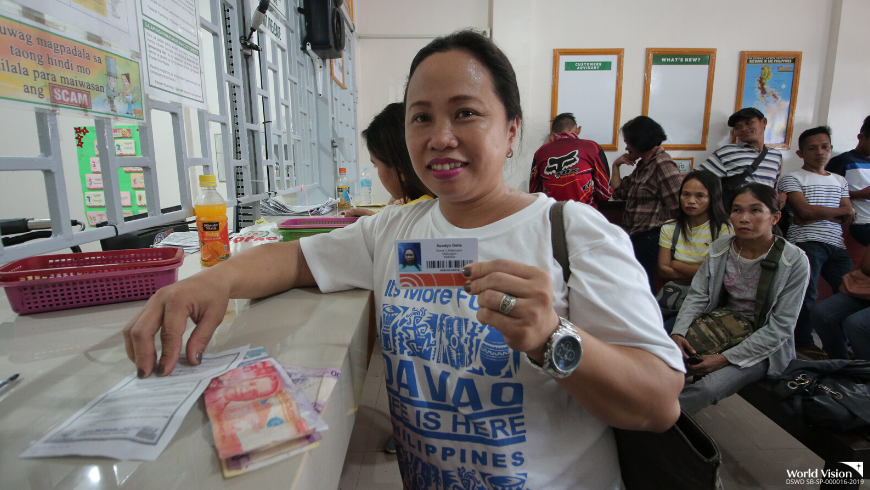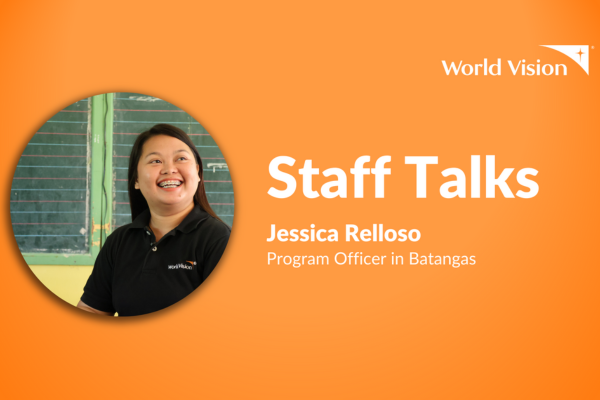Earning money inside evacuation camps

Three mothers, who lost the safety of their homes after an earthquake struck their village in Makilala, North Cotabato, participate during a Cash-for-Work project by World Vision
The Philippines has been through a lot of disasters, both natural and man-made, and the Filipinos have become resilient in recovering and generous in donating more than ever. However, there are still challenges that need to overcome when it comes to responding the needs of disaster-affected families.
The needs of the disaster-affected people changes over time. During and after several days of a disaster, the families need immediate help. That is when the government, NGOs and the private sector send relief items such as shelter kits for their stay in the evacuation center, clothing, and food packs, which usually consist of rice, canned goods, and instant food.
After several weeks or months, their needs evolve to temporary shelter and livelihood. And after several months or a year, the needs phase to rehabilitation concerns such as permanent shelter. However, there are cases that the assistance being provided to the affected families doesn’t sync with their needs. One example would be a family evacuee consuming canned goods as food supply for weeks or months.
World Vision makes sure that this concern is avoided by coordinating with the local government and consulting with the affected population.
World Vision’s Cash Programming
In the World Vision’s Cotabato Earthquake Response (WV-CER), the families are now in the recovery stage. World Vision addresses the livelihood needs of the evacuees by implementing Cash Programming, which consists of the Unconditional Cash Transfer (UCT) and Cash-for-Work (CFW).
UCT is a direct cash assistance to most vulnerable families. A family is considered most vulnerable when the household head is not capable to work – such as senior citizens, persons with disabilities, solo parent, pregnant or lactating mother, and minor. In the response, each household receives P2,000.

A Cash-for-Work participant received her P2,000 salary after working for 6 days. She said that the project is very timely because their main need for now is cash for their daily expenses.
The Cash-for-Work project, on the other hand, provides short-term work to abled individuals who will represent their family. In the case of WV-CER, the CFW participants worked for 4 hours a days in 6 days. They also received P2,000 as salary. The advantage of CFW is that it can be utilized to improve the evacuation camps where the CFW participants. They were tasked to clear the camp grounds by uprooting grass, make drainage around the camp, and those who have experience in carpentry were tasked to make the communal kitchen and latrines.
Rovelyn, a CFW participant, shared that the project is very timely because their main need in the evacuation camp is money for their daily expenses. “It is very helpful that we have this avenue to earn so that we can decide on what to cook everyday and not just rely on the relief items that are given to us,” the 39-year-old mother shared.
So far, 110 households benefitted from UCT while 822 households participated in the CFW project.
Technology in humanitarian aid
In WV-CER, evacuees carrying orange IDs during relief distribution are visible. These orange IDs are part of World Vision’s Last Mile Mobile Solutions or LMMS. It is a technology solution developed by World Vision to simplify and fasten beneficiary registration, verification, distribution planning, and monitoring. LMMS uses mobile phones for portability and it can also be accessed offline when being used in remote areas.
“It is more organized to have this kind of relief distribution. I received my Cash-for-Work salary without hassle because the system is already in place,” shared Ernesto.
Responding to multiple humanitarian crisis in the Philippines
Since October last year, the country faced different disasters every month. World Vision is responding to the families affected by the strong earthquake that hit North Cotabato, Typhoon Kammuri in Bicol region, and the recent Taal Volcano eruption in Batangas. The organization remains present in Marawi City to support the displaced families which was caused by the 2017 armed conflict.









